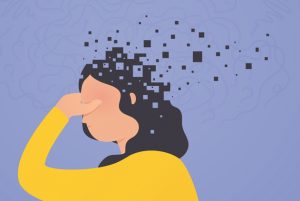By Amy Hoffmann Schenk, RN, BSN, MS Ed, Community Engagement Lead
 Alzheimer’s disease impacts more women than men. Two-thirds of those with Alzheimer’s are women! On Mother’s Day, many families are coping with mothers, grandmothers, aunts, and sisters who are living with Alzheimer’s disease.
Alzheimer’s disease impacts more women than men. Two-thirds of those with Alzheimer’s are women! On Mother’s Day, many families are coping with mothers, grandmothers, aunts, and sisters who are living with Alzheimer’s disease.
According to the Alzheimer’s Association 2023 statistics, over 6.7 million people have Alzheimer’s disease in the United States. That is roughly the same number of people as the entire state of Indiana. The total number of Alzheimer’s patients in the US is expected to almost double by the year 2050 to 13 million people.
In 1903, some 120 years ago, Dr. Alois Alzheimer identified changes in the brain of a 51-year-old woman named Auguste Dieter. After Ms. Dieter died, her brain was examined. Dr. Alzheimer, a psychiatrist, and neuropathologist, identified amyloid plaques and neurofibrillary tangles in Ms. Dieter’s brain tissue. These changes in the brain became identifiers of what is now known as Alzheimer’s disease.
There are many myths and misconceptions about Alzheimer’s disease. While we still have much to learn, we have disproven the following myths.
MYTH: If you live long enough, you will get Alzheimer’s disease. Alzheimer’s disease is not normal aging. While age is the greatest risk factor for developing Alzheimer’s disease, not everyone who lives past a certain birthday will develop it. There are age-related changes in our memory and cognition as we age, but Alzheimer’s is not a given.
MYTH: The only way to conclusively diagnose Alzheimer’s disease is by autopsy. Alzheimer’s is a neurological disorder affecting memory, thinking, and behavior, and it is the most common cause of dementia in older adults. Diagnosing Alzheimer’s disease involves a comprehensive evaluation, including a medical history, physical examination, and various tests to assess cognitive function. The diagnostic process typically involves the following steps:
1. Medical history and physical examination: The doctor will ask the patient about their symptoms, medical history, and family history of Alzheimer’s disease or other neurological disorders. They will also conduct a physical examination to rule out other possible causes of memory problems, such as infections or tumors.
2. Cognitive testing: The doctor may perform a series of tests to assess the patient’s cognitive function, such as memory, language, problem-solving, and attention. These tests may include the Mini-Mental State Examination (MMSE) or the Montreal Cognitive Assessment (MoCA).
3. Brain imaging: Imaging tests such as magnetic resonance imaging (MRI) or computed tomography (CT) scans can help identify structural changes in the brain associated with Alzheimer’s disease, such as hippocampus shrinkage.
4. Blood tests: Blood tests can help rule out other conditions that may cause memory problems, such as thyroid disease, vitamin deficiencies, or infections.
5. Neuropsychological testing: This type of testing can provide a more detailed assessment of the patient’s cognitive abilities and help differentiate Alzheimer’s disease from other forms of dementia.
6. Genetic testing: Genetic testing may be recommended in certain cases to determine if the patient has a genetic mutation that increases their risk of developing Alzheimer’s disease.
MYTH: Alzheimer’s and dementia are the same things. Alzheimer’s disease is a type of dementia. Dementia is a collection of symptoms, such as impaired thinking, challenges with memory, confusion, difficulty in reasoning, and changes in personality and demeanor. Alzheimer’s is the most common type of dementia, but there are other types as well. Some of these other types of dementia include vascular dementia, dementia with Lewy bodies, and frontotemporal dementia.
MYTH: Only people in their 70s and older get Alzheimer’s disease. In many instances, early symptoms of Alzheimer’s appear when one is in their mid to late 60s. Some people start to show symptoms of Alzheimer’s disease as early as 30. When symptoms begin between ages 30 and 60, it is considered younger-onset Alzheimer’s. While early onset is much less common, it is a growing concern in the USA. According to the Alzheimer’s Association:
“Newly analyzed data from the Health and Retirement Survey (HRS) indicates that there may be as many as half a million Americans under age 65 with dementia or cognitive impairment at a severity level consistent with dementia. Combining this with data from other studies, the Alzheimer’s Association calculates that there are between 220,000 and 640,000 people with early onset Alzheimer’s or related dementia in the U.S. today.”
What can you do if you are concerned about your memory or the memory of someone you know? The first thing to do is to consult your healthcare practitioner. Having a baseline memory screen is a sound practice and can be done in your health care practitioner’s office. In addition, the Neuropsychiatric Research Center of Southwest Florida offers free memory screens. All you need to do is contact the office at 239-939-7777. Most times, memory issues are a result of other factors. Lack of sleep, extreme stress, other medical conditions and even depression can cause memory issues, so getting things checked out is important!
At the Neuropsychiatric Research Center, we offer many cutting-edge clinical studies that are focused on addressing memory issues. Have a concern about your memory?
Contact NPRC at 239.939.7777 today.
References:
Maslow, K.https://www.alz.org/national/documents/report_
earlyonset_summary.pdf..
The Alzheimer’s Association:
https://www.alz.org/alzheimers-dementia/facts-figures
NIH:
https://www.nia.nih.gov/health/11-myths-about-alzheimers-disease










